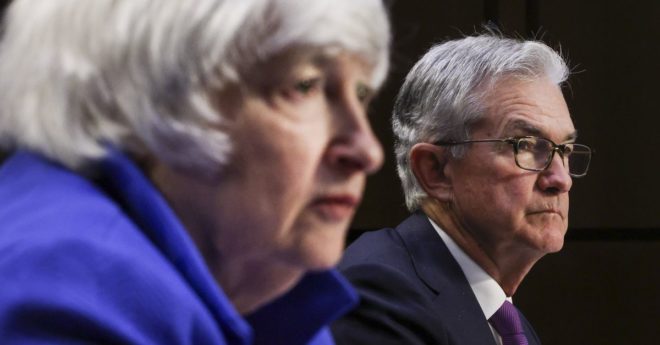Federal Reserve Chairman Jerome Powell called the development of a U.S. central bank digital currency (CBDC) “critical work,” telling Senate Banking Committee ranking member Sen. Pat Toomey (R-Pa.) that “broad consultation and, ultimately, authorizing legislation from Congress” would be “ideal.”
A two-and-a-half hour committee hearing intended to discuss the CARES Act – the $2.2 trillion economic stimulus package signed into law by then-President Donald Trump in March 2020 – became heated as committee members debated the upcoming vote to raise the debt ceiling, which Treasury Secretary Janet Yellen has said had to be done by Oct. 18 for the U.S. government to avoid a default on its existing legal obligations, including Social Security benefits and military salaries.
Powell endorsed Congress passing legislation that would authorize a digital dollar, responding to a question from Toomey about whether such legislation was needed.
Toomey was the only lawmaker to ask cryptocurrency-related questions, telling the Fed chair the U.S. central bank may not be well-suited to becoming a retail bank, and advocating for a combination of privately issued digital currencies and a true central bank digital currency.
“The privacy of Americans has to be respected,” Toomey said. “We shouldn’t design a central bank digital dollar that allows the government to spy on Americans every transaction.”
Broader regulation
Though the debt ceiling standoff was the main topic of conversation, issues of financial privacy were also featured during Tuesday’s hearing.
Sen. Cynthia Lummis (R-Wyo.), a well-known supporter of cryptocurrencies and blockchain technology, lambasted the Treasury Department for the Internal Revenue Service’s (IRS) push to enact new regulations requiring banks to report transactions from all accounts with over $600.
“This is invasive of privacy,” Lummis told Yellen. “Wyoming’s people literally will find alternatives to traditional banks just to thwart IRS access to their personal information, not because they’re trying to hide anything, but because they’re not willing to share everything.”
Sen. Elizabeth Warren (D-Mass.) took a different stance on financial regulation, calling Powell a “dangerous man” for his history of “deregulatory actions.”
“Your record gives me grave concern,” Warren told Powell. “Over and over, you have acted to make our banking system less safe … and it’s why I will oppose your renomination” as head of the U.S. central bank when his term ends in 2022. (His term as a member of the Board of Governors ends in January 2028.)




